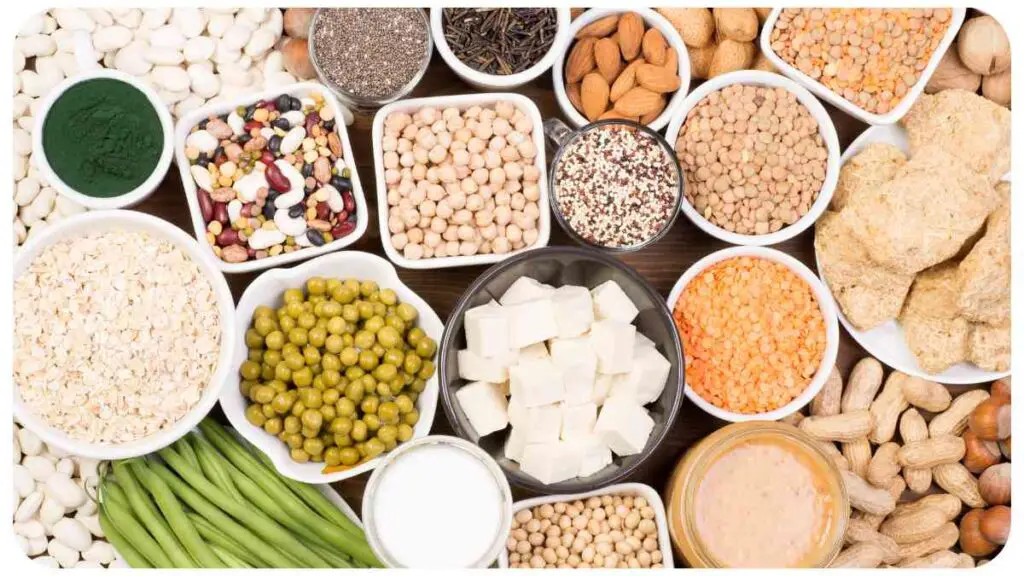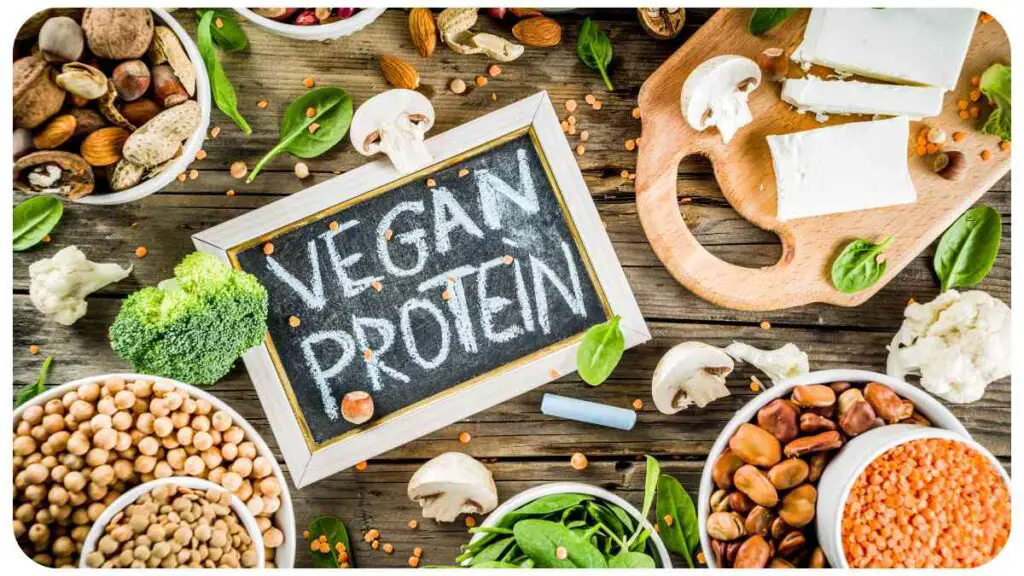Welcome to our comprehensive guide on vegan protein sources. If you’re following a vegan lifestyle or considering a plant-based diet, it’s essential to ensure you’re meeting your protein needs while enjoying a variety of nutritious and delicious foods.
In this article, we’ll explore the world of vegan protein, offering insights, tips, and valuable information to help you make informed choices. Let’s dive in!
| Key Takeaways from “The Importance of Vegan Protein Sources” |
|---|
| 1. Vegan protein sources include legumes, grains, nuts, seeds, soy products, and plant-based protein powders. |
| 2. Incorporating a variety of vegan protein sources ensures a complete amino acid profile and supports overall health. |
| 3. Vegan protein sources are not only rich in protein but also provide fiber, antioxidants, and heart-healthy fats. |
| 4. Proper meal planning and prepping can help ensure adequate protein intake on a vegan diet. |
| 5. It’s important to address common concerns and myths about vegan protein, such as protein adequacy and digestibility. |
| 6. Maximizing protein intake on a vegan diet can be achieved through mindful choices, reading food labels, and seeking local vegan options. |
| 7. Overcoming challenges on a vegan diet includes finding local vegan options, managing social pressure, and addressing nutrient gaps with proper supplementation if needed. |
| 8. Additional reading sources on vegan protein include Medical News Today, Healthline, and BBC Good Food. |
| 9. FAQs address common questions about protein intake, amino acids, digestibility, and potential risks of excessive protein consumption on a vegan diet. |
| 10. Embracing a balanced vegan diet with adequate protein is not only beneficial for individual health but also for environmental sustainability and animal welfare. |
2. Understanding Protein and Veganism

Protein is an essential nutrient that plays a vital role in our overall health and well-being. It is crucial for building and repairing tissues, producing enzymes and hormones, and aiding in the functioning of our immune system.
While animal products are often associated with protein, there are plenty of plant-based sources that can provide all the necessary amino acids our bodies need.
The health benefits of a vegan diet are backed by scientific research, exploring the benefits link, which highlights the positive impact on cardiovascular health, weight management, and disease prevention. Embracing plant-based protein sources is key to maintaining a balanced vegan lifestyle.
3. The Importance of Protein in a Plant-Based Diet
Adequate protein intake is particularly important for individuals following a vegan lifestyle. Protein helps to support muscle growth and repair, promotes satiety, and assists in maintaining a healthy weight.
By incorporating a variety of plant-based protein sources into your diet, you can ensure you receive the necessary nutrients for optimal health.
4. Different Types of Vegan Protein Sources
Legumes
One of the most versatile and commonly recognized vegan protein sources is legumes. These include options such as lentils, chickpeas, black beans, and kidney beans. Legumes are not only rich in protein but also contain high amounts of fiber, vitamins, and minerals. They can be incorporated into soups, stews, salads, and even made into plant-based burgers and spreads.
| Legume | Protein Content (per 100g) |
| Lentils | 9g |
| Chickpeas | 19g |
| Black Beans | 21g |
| Kidney Beans | 24g |
Grains
Grains are another fantastic source of vegan protein. Whole grains like quinoa, brown rice, and oats provide good amounts of protein, along with complex carbohydrates and fiber. These grains can be used as a base for salads, stir-fries, or enjoyed as side dishes.
| Grain | Protein Content (per 100g) |
| Quinoa | 4g |
| Brown Rice | 2g |
| Oats | 17g |
Nuts and Seeds
Nuts and seeds are not only packed with healthy fats but also offer a good amount of protein. Incorporating almonds, walnuts, chia seeds, and flaxseeds into your diet can be a great way to boost your protein intake. These can be enjoyed as a snack, sprinkled on salads or oatmeal, or used in baking.
| Nut/Seed | Protein Content (per 100g) |
| Almonds | 21g |
| Walnuts | 15g |
| Chia Seeds | 17g |
| Flaxseeds | 18g |
Soy and Soy Products
Soybeans and soy products offer a complete source of protein for vegans. Foods like tofu, tempeh, and edamame are not only great sources of protein but also provide essential amino acids, fiber, and minerals. These can be used to create a variety of delicious dishes, including stir-fries, salads, and even vegan meat alternatives.
| Soy Product | Protein Content (per 100g) |
| Tofu | 8g |
| Tempeh | 19g |
| Edamame | 11g |
Plant-Based Protein Powders
For those looking for an additional protein boost, plant-based protein powders can be a convenient option. These powders are typically made from sources like peas, brown rice, or hemp and can be easily added to smoothies, baked goods, or even mixed with water for a quick protein shake.
| Protein Powder | Protein Content (per serving) |
| Pea Protein | 25g |
| Brown Rice | 24g |
| Hemp | 20g |
5. Nutritional Benefits of Vegan Protein Sources

When incorporating vegan protein sources into your diet, it’s important to recognize the additional nutrients they provide beyond protein content alone.
Amino Acid Profile
While animal proteins are considered complete proteins, vegan protein sources can still provide all essential amino acids when combined strategically. By incorporating a variety of vegan protein sources, you ensure you’re getting a complete amino acid profile to support your body’s needs.
Looking for vegan power foods to support your protein needs? Check out these power foods that provide essential nutrients while promoting muscle growth and recovery. Incorporating a variety of legumes, seeds, and plant-based protein powders will help you meet your protein goals.
Fiber Content
Many vegan protein sources, such as legumes and whole grains, are also rich in fiber. Fiber helps regulate digestion, promotes feelings of fullness, and supports a healthy gut. By choosing vegan protein sources, you also boost your fiber intake and overall digestive health.
Antioxidants and Phytochemicals
Plants are rich in antioxidants and phytochemicals, which have been linked to various health benefits, including reduced risk of chronic diseases. By choosing vegan protein sources, you not only meet your protein needs but also provide your body with a wide range of beneficial compounds.
Heart-Healthy Fats
Certain vegan protein sources, like nuts and seeds, are high in heart-healthy fats, such as omega-3 fatty acids. These fats play a crucial role in supporting heart health, brain function, and reducing inflammation.
6. Incorporating Vegan Protein Sources into Your Diet
Now that we understand the different vegan protein sources and their nutritional benefits, let’s explore how to incorporate them into a balanced plant-based diet.
Meal Planning and Prepping
One of the key aspects of successfully including vegan protein sources in your diet is proper meal planning and prepping. Dedicate some time each week to plan your meals, ensuring they include a variety of protein-rich options. Prepare ingredients in advance to make cooking easier and more efficient.
Cooking Methods
Experiment with various cooking methods to enjoy the full flavors and textures of vegan protein sources. Try baking tofu for a crispy texture, sautéing legumes and grains with flavorful spices, or roasting nuts and seeds for added crunch. Exploring different cooking techniques can make your meals more exciting and enjoyable.
Ensuring sufficient protein intake on a vegan diet is easier than you think. Here are 15 easy ways to get enough protein while following a plant-based lifestyle. From quinoa and tofu to lentils and tempeh, these options offer diverse and delicious sources of plant-based protein.
Combining Protein Sources
To ensure you’re getting a complete amino acid profile, it’s beneficial to combine different vegan protein sources. For example, pairing legumes with grains or nuts with seeds can create a synergistic effect, providing a range of essential amino acids.
Get creative and experiment with different combinations to enhance both the taste and nutrition of your meals.
Timing and Quantity
To optimize protein absorption and utilization, distribute your protein intake evenly throughout the day. Including protein-rich foods in every meal and snack can help maintain steady energy levels and support muscle growth and repair. Pay attention to portion sizes and aim for a balance that aligns with your individual needs and activity levels.
7. Addressing Concerns and Myths About Vegan Protein
Despite the abundance of vegan protein sources, concerns and myths surrounding protein adequacy and completeness on a plant-based diet still circulate. Let’s debunk some of these common misconceptions:
Protein Adequacy and Completeness
By incorporating a variety of vegan protein sources, it is absolutely possible to meet your protein needs on a plant-based diet. With careful planning and consideration, you can achieve a complete amino acid profile without relying on animal products.
It’s important to recognize that protein is found in many plant-based foods, not just meat and dairy.
Digestibility and Absorption
While some proteins may have slightly lower digestibility compared to animal-based proteins, this doesn’t mean they are not beneficial. By combining different protein sources, consuming a varied diet, and focusing on proper cooking methods, you can enhance the digestibility and absorption of plant-based proteins.
Non-Issue of B12 Deficiency
Vitamin B12 is naturally found in animal-based foods and is essential for nerve function and the production of red blood cells. As a vegan, it’s crucial to supplement with vitamin B12, as it is difficult to obtain sufficient amounts from plant sources alone.
Fortified foods and B12 supplements are readily available and should be included in a vegan diet to ensure optimal B12 levels.
Discover how veganism and fitness go hand in hand for optimal performance. Learn how to get the protein you need through plant-based sources, such as beans, seitan, and vegan protein supplements. Fuel your workouts while supporting animal welfare and sustainability.
Improving Protein Bioavailability
Plant-based proteins can have slightly lower bioavailability compared to animal-based proteins. However, by incorporating vitamin C-rich foods like citrus fruits, tomatoes, or bell peppers, you can enhance the absorption of plant-based iron and increase the overall bioavailability of proteins in your diet.
8. Tips for Maximizing Protein Intake on a Vegan Diet
Here are some practical tips to help you maximize your protein intake on a vegan diet:
Snack Options
Choose protein-rich snacks to keep you satisfied between meals. Opt for options like roasted chickpeas, trail mix with nuts and seeds, or vegan protein bars.
Protein-Rich Recipes
Experiment with protein-packed recipes to add variety to your meals. Try lentil soups, quinoa salads, chickpea curries, or tofu stir-fries. Get creative and enjoy the delicious world of vegan cooking!
On-the-Go Protein Sources
When you’re on the go, it’s essential to have convenient protein options. Consider packing protein-rich snacks such as individual nut butter packets, vegan protein shake powders, or energy balls.
Reading Food Labels
Be attentive to food labels and ingredient lists to identify hidden sources of animal products. Look for keywords like whey, casein, or gelatin to ensure your choices align with your vegan lifestyle.
9. Overcoming Challenges and Enjoying a Balanced Vegan Diet

Embracing a vegan lifestyle may come with challenges, but with the right approach, it can be an enjoyable and sustainable choice. Here are some tips to overcome common hurdles:
Finding Local Vegan Options
Explore your local community for vegan-friendly restaurants, markets, and cafes. Connecting with like-minded individuals and participating in vegan events can help you discover new and exciting plant-based options.
Dining Out Strategies
When dining out, don’t shy away from asking for vegan options or modifications to existing dishes. Many establishments are accommodating to dietary preferences, and you might be pleasantly surprised by the variety of delicious plant-based meals available.
Boost your energy levels and fortify your immune system with plant-based iron sources. Explore the best plant-based sources of iron like spinach, lentils, and pumpkin seeds, which provide essential minerals for a healthy vegan lifestyle. Embrace these iron-rich foods to thrive on a plant-powered diet
Overcoming Social Pressure
Being the only vegan in a group can sometimes lead to social pressure or awkward situations. Remember that your decision to follow a vegan lifestyle is personal and rooted in your values.
Respond politely to inquiries or concerns, and focus on the positive impact your choices have on the environment, animals, and your well-being.
Dealing with Nutrient Gaps
While a well-planned vegan diet can provide all necessary nutrients, it’s important to monitor your nutrient intake. Consider consulting a registered dietitian or nutritionist to ensure you’re meeting your individual nutrient requirements and consider appropriate supplementation if needed.
10. Conclusion
In conclusion, incorporating vegan protein sources into your diet is not only beneficial for your health but also for the environment. By understanding the various options available, their nutritional benefits, and implementing practical strategies, you can confidently enjoy a balanced plant-based diet while meeting your protein needs.
Remember to embrace variety, explore new recipes, and continue to educate yourself about the diverse world of vegan protein sources. Cheers to your journey towards a healthy and compassionate lifestyle!
Further Reading
Here are some additional resources for further reading on vegan protein sources:
Vegan Protein Chart – Medical News Today: This article provides a comprehensive chart listing various plant-based protein sources and their protein content per serving size.
Protein for Vegans and Vegetarians – Healthline: Healthline offers an informative guide on protein sources for vegans and vegetarians, including tips on meeting protein needs, combining plant-based proteins, and debunking myths surrounding vegan protein.
The Best Sources of Protein for Vegans – BBC Good Food: BBC Good Food presents an overview of the best sources of protein for vegans, including detailed explanations of different plant-based protein sources and their benefits.
FAQs
Here are some frequently asked questions about vegan protein:
How can I ensure I’m getting enough protein on a vegan diet?
To ensure sufficient protein intake on a vegan diet, incorporate a variety of protein-rich foods such as legumes, grains, nuts, seeds, and plant-based protein powders. Plan and balance your meals to include a combination of different protein sources throughout the day.
Can combining plant-based protein sources provide all the essential amino acids?
Yes, by combining various plant-based protein sources, such as legumes and whole grains or nuts and seeds, you can obtain a complete amino acid profile. Consuming a varied diet with a range of protein sources helps ensure you receive all the necessary amino acids your body needs.
How does the protein digestibility of plant-based proteins compare to animal-based proteins?
Plant-based proteins may have slightly lower digestibility compared to animal-based proteins. However, by using proper cooking methods and combining protein sources, you can improve their digestibility and enhance absorption.
Should I be concerned about protein deficiency on a vegan diet?
With proper meal planning and a varied diet, protein deficiency is unlikely on a well-rounded vegan diet. By incorporating a range of plant-based protein sources and meeting your caloric needs, you can easily obtain sufficient protein.
Are there any potential risks or drawbacks to consuming too much protein on a vegan diet?
While protein is essential, excessively high protein intake, especially from processed protein supplements, may have some health risks. It’s important to maintain a balanced diet and not rely solely on protein supplements for your protein needs. Consult a healthcare professional or dietitian for personalized advice on protein intake.

Hi! My name is Hellen James, and I’m a vegan lifestyle enthusiast. I’ve been living the vegan lifestyle for over 10 years now, and it’s been one of the best decisions I’ve ever made. The food is amazing, the community is incredible, and there’s no way I could go back after experiencing all this firsthand.


